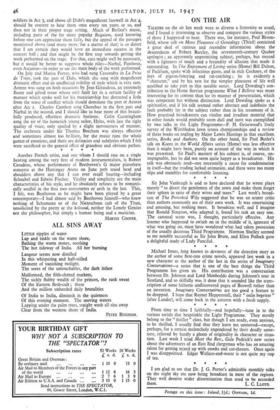ON THE AIR
TALKERS on the air last week were as diverse a fraternity as usual, and I found it interesting to observe and compare the various styles of those I happened to hear. There was, for instance, Paul Bloom- field, whose talk on More Pleasures of Genealogy (Third) contained a great deal of curious and recondite information about the descendants of Robert Barclay, the seventeenth-century Quaker apologist ; an apparently unpromising subject, perhaps, but treated with a lightness of touch and a fecundity of allusion that made it outstanding. In The Enjoyment of Living series (Home) Bill Dalton, of Peckham, spoke with infectious gusto, and in rich Cockney, of the joys of pigeon-fancying and rat-catching ; he is evidently a " character," and by his zest for the simpler pleasures of life well qualified to take part in this notable series. Lord Dowding's con- tribution to the Home Service programme What I Believe was more interesting for its content than for its manner of presentation, which was competent but without distinction. Lord Dowding spoke as a spiritualist, and if his talk seemed rather abstract and indefinite the fault probably lay in the subject rather than in his treatment of it. How practised broadcasters can vitalise and irradiate material that in other hands would probably seem dull and inert was exemplified by two talks in the Light Programme—F. H. Grisewood's lively survey of the Wimbledon lawn tennis championships and a review of three books on angling by Major Lewis Hastings in that excellent series, Books and Authors. On the other hand, Sir Paul Butler's talk on Korea in the World Affairs series (Home) was less effective than it might have been, purely on account of the way in which it was presented. Sir Paul's mastery of his subject is, of course, un- impugnable, but he did not seem quite happy as a broadcaster. His talk was obviously read—not necessarily a cause for condemnation in itself—but the reading lacked animation, and there were too many slips and stumbles for comfortable listening.
* * * *
Sir John Vanbrugh is said to have declared that he wrote plays merely " to divert the gentlemen of the town and make them forget their spleen in spite of their wives and taxes." Last week's broad- cast of The Provoked Wife suggested that he was an acuter critic than authors commonly are of their own work. It was entertaining and amusing, but nothing more. It broadcast well, and I imagine that Ronald Simpson, who adapted it, found his task an easy one. The carousal scene was, I thought, particularly effective. Any listener who happened to switch on in the middle of it, ignorant of what was going on, must have wondered what had taken possession of the usually decorous Third Programme. Norman Shelley seemed to me notably successful as Sir John Brute, and Ellen Pollock gave a delightful study of Lady Fanciful. * * * * Michael Innes, long known to devotees of the detective story as the author of some first-rate crime novels, appeared last week in a new character as the author of the last in the series of Imaginary Conversations—a series that is one of -the best things the Third Programme has given us. His contribution was a conversation between Dr. Johnson and Lord Monboddo during Johnson's tour in Scotland, and so skilfully was it done that it sounded like the trans- cription of some hitherto undiscovered pages of Boswell rather than an invention. Imaginary Conversations are too good a feature tc be dropped. I hope that Rayner Heppenstall, their " onlie begetter " (after Landor), will come back in the autumn with a fresh supply.
* * *
From time to time I faithfully—and hopefully—tune in to the various serials that besprinkle the Light Programme. They mostly belong to the " thriller " class, but though I am ready, even anxious, to be thrilled, I usually find that they leave me unmoved—except, perhaps, for a certain melancholy engendered by their deadly same- ness, relieved by hardly a gleam of originality in character or situa- tion. Last week I tried Meet the Rev., Gale Pedrick's new series about the adventures of an East End clergyman who has an amazing talent for getting mixed up with crooks and cut-throats. Once again I was disappointed. Edgar Wallace-and-water is not quite my cup of tea.
* * * * I am glad to see that Dr. J. G. Porter's admirable monthly talks' on the night sky are now being broadcast in most of the regions. They well deserve wider dissemination than used to be accorded


































 Previous page
Previous page